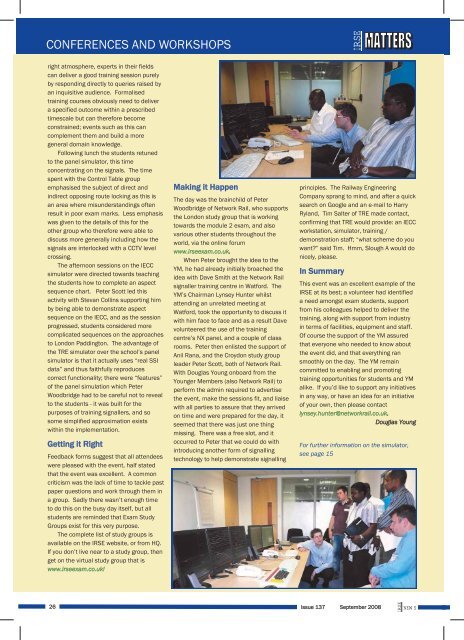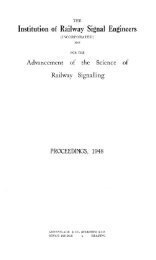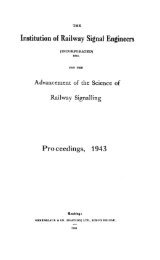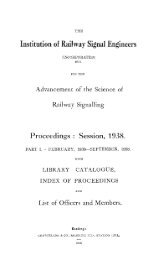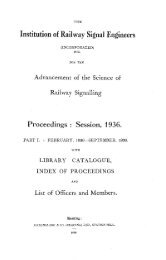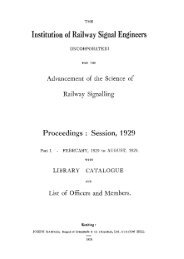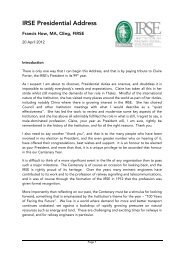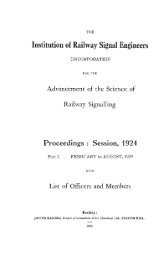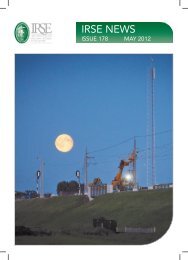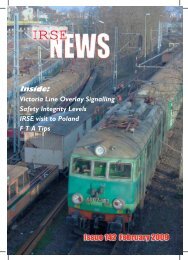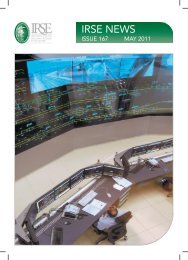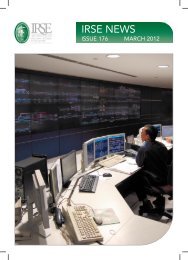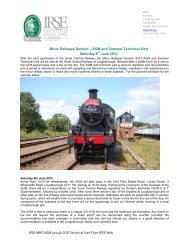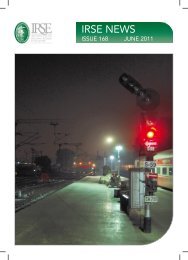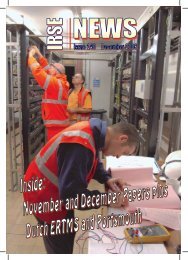IRSE Sept 08.indd
IRSE Sept 08.indd
IRSE Sept 08.indd
Create successful ePaper yourself
Turn your PDF publications into a flip-book with our unique Google optimized e-Paper software.
CONFERENCES AND WORKSHOPS<br />
<strong>IRSE</strong><br />
right atmosphere, experts in their fields<br />
can deliver a good training session purely<br />
by responding directly to queries raised by<br />
an inquisitive audience. Formalised<br />
training courses obviously need to deliver<br />
a specified outcome within a prescribed<br />
timescale but can therefore become<br />
constrained; events such as this can<br />
complement them and build a more<br />
general domain knowledge.<br />
Following lunch the students retuned<br />
to the panel simulator, this time<br />
concentrating on the signals. The time<br />
spent with the Control Table group<br />
emphasised the subject of direct and<br />
indirect opposing route locking as this is<br />
an area where misunderstandings often<br />
result in poor exam marks. Less emphasis<br />
was given to the details of this for the<br />
other group who therefore were able to<br />
discuss more generally including how the<br />
signals are interlocked with a CCTV level<br />
crossing.<br />
The afternoon sessions on the IECC<br />
simulator were directed towards teaching<br />
the students how to complete an aspect<br />
sequence chart. Peter Scott led this<br />
activity with Stevan Collins supporting him<br />
by being able to demonstrate aspect<br />
sequence on the IECC, and as the session<br />
progressed, students considered more<br />
complicated sequences on the approaches<br />
to London Paddington. The advantage of<br />
the TRE simulator over the school’s panel<br />
simulator is that it actually uses “real SSI<br />
data” and thus faithfully reproduces<br />
correct functionality; there were “features”<br />
of the panel simulation which Peter<br />
Woodbridge had to be careful not to reveal<br />
to the students - it was built for the<br />
purposes of training signallers, and so<br />
some simplified approximation exists<br />
within the implementation.<br />
Getting it Right<br />
Feedback forms suggest that all attendees<br />
were pleased with the event, half stated<br />
that the event was excellent. A common<br />
criticism was the lack of time to tackle past<br />
paper questions and work through them in<br />
a group. Sadly there wasn’t enough time<br />
to do this on the busy day itself, but all<br />
students are reminded that Exam Study<br />
Groups exist for this very purpose.<br />
The complete list of study groups is<br />
available on the <strong>IRSE</strong> website, or from HQ.<br />
If you don’t live near to a study group, then<br />
get on the virtual study group that is<br />
www.irseexam.co.uk!<br />
Making it Happen<br />
The day was the brainchild of Peter<br />
Woodbridge of Network Rail, who supports<br />
the London study group that is working<br />
towards the module 2 exam, and also<br />
various other students throughout the<br />
world, via the online forum<br />
www.irseexam.co.uk.<br />
When Peter brought the idea to the<br />
YM, he had already initially broached the<br />
idea with Dave Smith at the Network Rail<br />
signaller training centre in Watford. The<br />
YM’s Chairman Lynsey Hunter whilst<br />
attending an unrelated meeting at<br />
Watford, took the opportunity to discuss it<br />
with him face to face and as a result Dave<br />
volunteered the use of the training<br />
centre’s NX panel, and a couple of class<br />
rooms. Peter then enlisted the support of<br />
Anil Rana, and the Croydon study group<br />
leader Peter Scott, both of Network Rail.<br />
With Douglas Young onboard from the<br />
Younger Members (also Network Rail) to<br />
perform the admin required to advertise<br />
the event, make the sessions fit, and liaise<br />
with all parties to assure that they arrived<br />
on time and were prepared for the day, it<br />
seemed that there was just one thing<br />
missing. There was a free slot, and it<br />
occurred to Peter that we could do with<br />
introducing another form of signalling<br />
technology to help demonstrate signalling<br />
principles. The Railway Engineering<br />
Company sprang to mind, and after a quick<br />
search on Google and an e-mail to Harry<br />
Ryland, Tim Salter of TRE made contact,<br />
confirming that TRE would provide: an IECC<br />
workstation, simulator, training /<br />
demonstration staff; “what scheme do you<br />
want?” said Tim. Hmm, Slough A would do<br />
nicely, please.<br />
In Summary<br />
This event was an excellent example of the<br />
<strong>IRSE</strong> at its best; a volunteer had identified<br />
a need amongst exam students, support<br />
from his colleagues helped to deliver the<br />
training, along with support from industry<br />
in terms of facilities, equipment and staff.<br />
Of course the support of the YM assured<br />
that everyone who needed to know about<br />
the event did, and that everything ran<br />
smoothly on the day. The YM remain<br />
committed to enabling and promoting<br />
training opportunities for students and YM<br />
alike. If you’d like to support any initiatives<br />
in any way, or have an idea for an initiative<br />
of your own, then please contact<br />
lynsey.hunter@networkrail.co.uk.<br />
Douglas Young<br />
For further information on the simulator,<br />
see page 15<br />
26<br />
Issue 137 <strong>Sept</strong>ember 2008<br />
<strong>IRSE</strong><br />
NEWS


